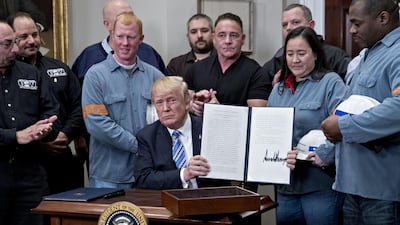Donald Trump’s decision on Thursday to roll out steep new tariffs on imports of aluminium and steel – initially excluding Mexico and Canada – provoked strong but split reactions.
Top lawmakers from Mr Trump’s own Republican party reaffirmed their strong differences with the White House, expressing dismay for the tariffs’ possible economic effects and the possibility of retaliation by trading partners – views echoed by much of industry.
Some manufacturers, however, were hopeful that skies would at last brighten for long-suffering domestic producers.
The powerful Utah Republican senator and chairman of the Senate Finance Committee Orrin Hatch said the tariffs were wrongheaded and would damage the economy.
“Simply put: This is a tax hike on American manufacturers, workers and consumers. Slapping aluminum and steel imports with tariffs of this magnitude is misguided,” Mr Hatch said in a statement.
“It undermines the benefits that the new tax law provides and runs counter to our goal of advancing pro-growth trade policies that will keep America competitive in the 21st century global economy.”
Paul Ryan, the Wisconsin Republican and speaker of the House of Representatives, said he would urge the White House to narrow the tariffs policy even further than the exemptions offered to Canada and Mexico.
“I disagree with this action and fear its unintended consequences. I am pleased that the president has listened to those who share my concerns and included an exemption for some American allies, but it should go further,” said Mr Ryan.
“There are unquestionably bad trade practices by nations like China, but the better approach is targeted enforcement against those practices.”
While individual manufacturers have strongly opposed the bill, the industry body the Alliance for American Manufacturing (AAM) hailed it as a turning point for beleaguered US metal producers.
“America’s steel and aluminum workers and companies will stabilize after years of unfair competition, regain market share and even hire more workers,” AAM president Scott Paul said in a statement.
Meanwhile the Ford Motor Company, an iconic American auto manufacturer, said the tariffs would raise prices and hurt US industry.
“Despite the fact that Ford buys the vast majority of its steel and aluminum for US production in the US, this action could result in an increase in domestic commodity prices – harming the competitiveness of American manufacturers,” the company said.
The lobby for big box stores and other vendors of consumer goods, the National Retail Federation, a pillar of the US economy, said the tariffs would wipe out the benefits of higher pay that ordinary members of the public were only just beginning to enjoy.
“The retail industry is extremely concerned by the administration’s apparent desire to ignite a trade war, where the net losers will be the very people the president wants to help,” the federation said.
“The true greatness of America cannot be realized when we build walls blocking the free flow of commerce in today’s global economy.”
And John McCain, the ailing but outspoken Arizona Republican who has opposed Mr Trump on lots of measures, said Thursday the tariffs were redolent of past failed policies and would hurt the US economy.
“America should confront China’s unfair trade practices, including its attempts to circumvent existing antidumping tariffs and its pilfering of American invention and innovation through coercion and outright theft,” Mr McCain said in a statement.
“President Trump squandered perhaps the most important opportunity to do that when he withdrew from the Trans-Pacific Partnership.”

